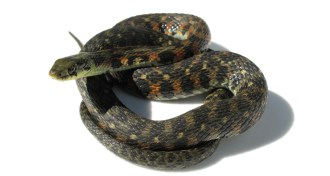All Stories
-
 Planetary Science
Planetary SciencePhilae lander touches down on comet 67P
Rosetta’s lander Philae has reached the surface of comet 67P/Churyumov-Gerasimenko and is starting to do science.
-
 Astronomy
AstronomyPhilae lander is in free fall toward comet 67P
The Rosetta spacecraft has nudged its lander Philae off its back toward the surface of comet 67P/Churyumov-Gerasimenko.
-
 Animals
AnimalsSnake moms-to-be crave toxic toads
The snake Rhabdophis tigrinus seeks out toxic toads to eat when breeding. The snakes can then pass the poisons on to her offspring as chemical defenses.
-
 Neuroscience
NeuroscienceSerotonin lies at the intersection of pain and itch
Serotonin may help relieve pain, but it also causes itch. A study shows why scratching just makes it worse.
-
 Health & Medicine
Health & MedicineWhooping cough shot shown safe for pregnant women
Women who get a booster shot against whooping cough, or pertussis, during pregnancy don’t increase their risk of having a problem birth, and they boost their babies’ immunity to the disease.
-
 Genetics
GeneticsHuman thoughts control mouse genes
Human brain waves trigger light that activates protein production in rodents.
-
 Planetary Science
Planetary SciencePhilae passes first go-no-go tests for comet landing
Philae and its mothership Rosetta are working through the final tests before scientists attempt to launch the lander toward the surface of comet 67P/Churyumov-Gerasimenko.
-
 Neuroscience
NeuroscienceChronic marijuana use may alter the brain
Long-term marijuana use may lead to reduced gray matter and increased white matter connectivity in the brain.
-
 Genetics
GeneticsGenes tell tale of cat domestication
A peek into cats’ genetic makeup may help reveal how hissing wild felines became purring tabbies.
-
 Astronomy
AstronomyRosetta’s countdown to comet landing has begun
Everything is on track for Rosetta mission scientists to attempt to set the Philae lander on the surface of comet 67P/Churyumov-Gerasimenko.
-
 Environment
EnvironmentThirdhand smoke poses lingering danger
Harmful cigarette chemicals that linger on surfaces, known as thirdhand smoke, can go on to pollute the air and may harm people’s health.
By Beth Mole -
 Planetary Science
Planetary ScienceRosetta prepares to let go of its comet lander
To date, everything is a go for scientists to attempt to land a robotic probe on a comet.